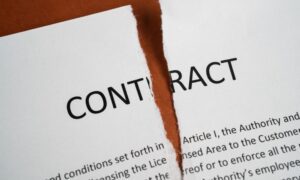Are non-disclosure agreements on their way out?

Recently, Hockey Canada, the national governing body for hockey in Canada, was pilloried for its handling of sexual assault claims. A politician, senator Marilou McPhedran, called for these type of agreements to be banned, at least in federally regulated workplace.
The organization released an NDA with the complainant of a high-profile alleged group sexual assault in 2018 involving eight hockey players, including some members of the world junior team, CBC News reports.
The NDA was officially withdrawn the day before Hockey Canada’s executives testified before a parliamentary committee that is looking into the group’s handling of the alleged sexual assault case, said the CBC.
Changes in the works
Meanwhile, in Australia, the Victoria government announced that it is considering restricting the use of non-disclosure agreements (NDAs) for workplace sexual harassment cases, among other steps to protect employees in workplaces.
According to the government, NDAs are often misused to silence victim-survivors, protect employer reputations, avoid full liability, and hide serial offending.
This will be the first time a “complex reform” is attempted, said the state government, adding that it will be working with unions, businesses, legal aids, as well as victim-survivors to develop the appropriate model and scope of the restriction before introducing legislation.
“The reforms in response to our recommendations will equip workers, employers and their representatives with the tools to better prevent and respond to workplace sexual harassment,” said Parliamentary Secretary for Workplace Safety Bronwyn Halfpenny in a statement.
‘Silenced No More ‘
In the spring, American legislators also passed a law that targeted NDAs.
House Bill 1795, dubbed the “Silenced No More Act”, was aimed squarely at these deals which attempt to silence harassment and discrimination in workplaces.
Under the bill, the legislature acknowledged there are existing provisions in non-disclosure and non-disparagement contracts between employers and employees that want to silence victims or those with knowledge of illegal discrimination, illegal harassment, illegal retaliation, wage and hour violations, or sexual assault in the workplace.
“It is the intent of the legislature to prohibit non-disclosure and non-disparagement provisions in agreements, which defeat the strong public policy in favour of disclosure,” read the bill.
The bill also wants to make “void and unenforceable” the provisions preventing an employee to disclose or discuss the conduct or existence of settlement involving the violations that occur at the workplace or at work-related events whether on or off the employment premises.
“Prohibited non-disclosure and non-disparagement provisions include those contained in employment agreements, independent contractor agreements, agreements to pay compensation in exchange for the release of a legal claim, or any other agreement between an employer and an employee,” it said.
While these agreements have tended to shield abusers, a social movement may also bring an end of their use.
With the rise of the #MeToo movement, NDAs have come under greater scrutiny because of the potential harm to employees who are effectively muzzled, which means they may miss out on much-needed supports — while the harasser is protected.
Prince Edward Island recently become the first jurisdiction in Canada to limit the use of these agreements in cases of discrimination and harassment.
The new law orders the use of NDAs only when it is “the expressed wish and preference of the relevant person concerned,” meaning someone who has experienced or made allegations about harassment or discrimination.
‘There’s a culture’
For lawyers, these deals are extremely prevalent and are employed in a lot of workplaces.
An extremely high percentage of settlements between employees and employers contains some version of an NDA, said Andrew Monkhouse, managing partner at Monkhouse Law Employment Lawyers.
Usually, the NDA is either a confidentiality clause, where someone is not allowed to discuss the circumstances or amounts of a settlement, or a non-disparagement clause, where employees who have been terminated agree to not disparage the company going forward, he said.
“There’s a culture — from what I can see — of employers asking for these types of NDAs in virtually all claims… whether or not they are applicable, they’re just seen as good and therefore asked for, in almost all cases.”
One problematic trend is this idea of using NDAs in almost all incidents, said Monkhouse, citing as an example New York City mayor Mike Bloomberg, who used NDAs to prevent women speaking out about his alleged history of inappropriate behaviour — and was shamed about it by Sen. Elizabeth Warren back in 2020.
“There’s a real question about how important those NDAs actually are, or if it’s something that companies demand just because they can…. I think that there could be more thought put towards whether or not a situation truly requires an NDA.”





